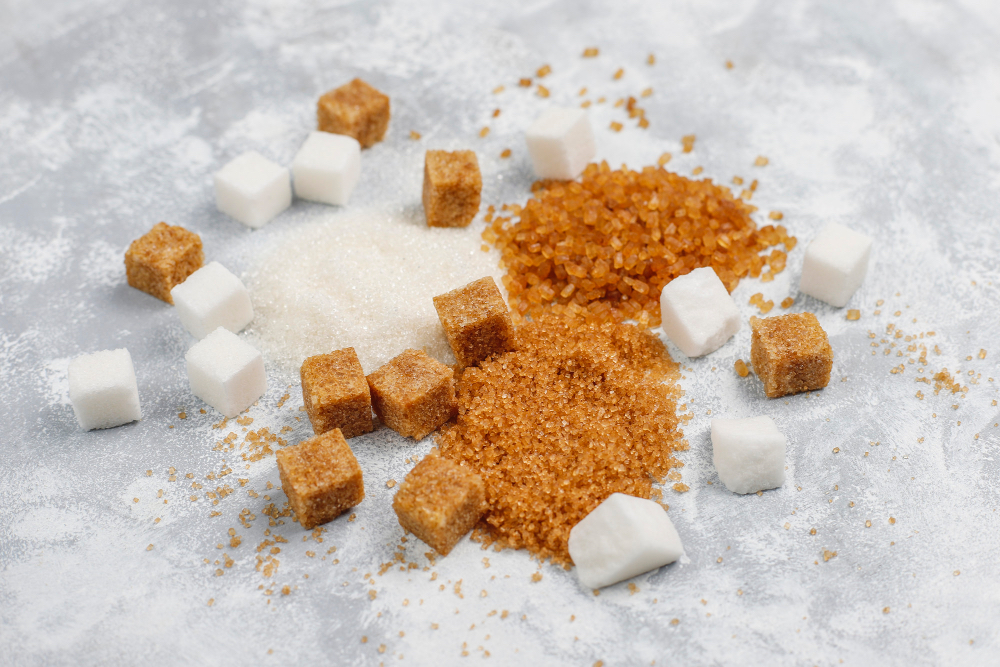Picture this: You’re at a family gathering, and the dessert table is brimming with traditional sweets. A well-meaning relative hands you a piece of jaggery-laden dessert, saying, “It is healthier than sugar – it is made from jaggery!”
You pause, wondering – is jaggery really better than sugar?
For anyone managing diabetes, questions like this are common. Jaggery, often celebrated for being natural and nutrient-rich, seems like a wholesome alternative to refined sugar. But does that mean it is a safe choice for diabetics?
This blog explores the benefits and risks of jaggery, especially for diabetics. We’ll take a closer look at its nutritional value, glycaemic index, and alternatives for managing blood sugar. Let’s find out if this traditional sweetener deserves a spot in a diabetic diet or if caution is the better choice.
What Makes Jaggery Different from Sugar?
Let’s compare the basics of jaggery and refined sugar to answer the common question – Is Jaggery better than sugar for health?
Refined sugar undergoes extensive chemical processing. This processing strips it of vital nutrients like vitamins and minerals and leaves behind pure sucrose crystals that offer no health benefits beyond calories. It is absorbed quickly and causes a sudden spike in blood sugar levels, high insulin levels and weight gain.

Jaggery, on the other hand, is a traditional sweetener made by boiling sugarcane juice or palm sap until it thickens and solidifies. It is made of long chains of sucrose, which means it takes longer to digest compared to refined sugar. It is minimally processed and retains more nutrients like plant-based iron, potassium, magnesium and zinc. Therefore, it can reduce the risk of anaemia, and has anti-allergic and cleansing properties that help clear mucus and pollutants from the lungs, making it helpful for conditions like asthma, coughs, and colds.
Additionally, the molasses in jaggery contains phenolic compounds, which are rich in antioxidants. These antioxidants help reduce oxidative stress in the body. Jaggery is also well-known for supporting digestion, relieving stomach pain, reducing acidity, boosting metabolism, burning belly fat and improving gut health.
Moreover, it also has a richer, molasses-like flavour. So we can summarise that while both jaggery and sugar are high in calories and carbohydrates, the additional nutritional traces and flavour in jaggery make it a popular choice for those looking to replace sugar with a more nutritious alternative for the average person.
But is jaggery good for diabetes?
The Glycaemic Index of Jaggery and Its Impact on Blood Sugar
Does jaggery increase sugar level?
The glycaemic index (GI) measures how quickly a carbohydrate-containing food raises blood sugar levels. Foods with a higher GI cause faster blood sugar spikes, while lower GI foods have a slower, more gradual impact.
It might surprise you to know that the glycaemic index of jaggery is around 84-85, which is higher than refined sugar (60-65) and brown sugar (70). Therefore, even though it has nutrient content and digests slightly slower that refined sugar, the end result of consuming jaggery is still a spike in blood sugar levels. Thus, jaggery may not be an ideal sweetener for diabetics and can be moderately taken for pre-diabetics.
Can Diabetic Patients Eat Jaggery?
Diabetics struggle to process sugars effectively due to insulin resistance or insufficient insulin production. Consuming high GI foods like jaggery can overwhelm their glucose management, leading to sugar spikes and worsening symptoms over time.

Experts agree that diabetics should avoid jaggery in large amounts due to its high glycaemic load. Instead, they recommend safer alternatives like stevia or monk fruit. Palm jaggery – which has a slightly lower GI – can be a marginally better option. However, it is best for diabetics to avoid sugar in all forms until sugar levels are under control. Thereafter, a combination of safe sweeteners can be consumed sparingly.
Jaggery offers some health benefits, such as iron and antioxidants. But for diabetics, the risks often outweigh the advantages. Therefore, moderation is the key. And consulting with a healthcare provider is essential before including jaggery in your diet.
Tips for Consuming Jaggery Safely
If you decide to include jaggery in your diet, there are certain things that you must bear in mind. These are as follows:
- Limit the portion size to less than a teaspoon per meal.
- Pair jaggery with low-GI foods like nuts, seeds, or whole grains. This will slow down sugar absorption.
- Use jaggery sparingly in cooking and baking. Opt for natural spices like cinnamon or nutmeg to enhance sweetness, instead.
Jaggery might be permissible for diabetics in remission or those with tightly controlled blood sugar levels. But always consult your healthcare provider before making dietary changes.
Alternatives to Jaggery for Blood Sugar Management
For diabetics seeking sweetness without compromising blood sugar control, there are some diabetes-friendly alternatives. For instance, stevia is a natural sweetener with zero calories and a glycaemic index of 0. Monk fruit is another zero-calorie option, which is packed with antioxidants. Thirdly, Allulose is a rare sugar substitute that doesn’t raise blood sugar and has potential metabolic benefits.
If you’re craving traditional flavours, jaggery can occasionally be used in minimal amounts. But for daily use, you should stick to low-GI sweeteners like stevia or monk fruit to avoid spikes in blood sugar. If you have sugar cravings, its best to satiate yourself with fruits like papaya, guava, pomegranates, berries, etc.
So, is jaggery better than sugar?
For the average person, jaggery is a more nutritious alternative due to its mineral content and lack of chemical processing. However, for diabetics, the high calories and its potential to increase blood sugar levels make it a less ideal choice.
If you are managing diabetes, it is crucial to prioritize sweeteners that support blood sugar stability, such as stevia, monk fruit, or allulose. Bear in mind, that diabetes management is not just about avoiding sugar but addressing the root cause of insulin resistance.
Always consult your healthcare provider before introducing new foods into your diet. By making informed choices and taking control of your health, you can enjoy sweetness in life – without compromising on your well-being.



